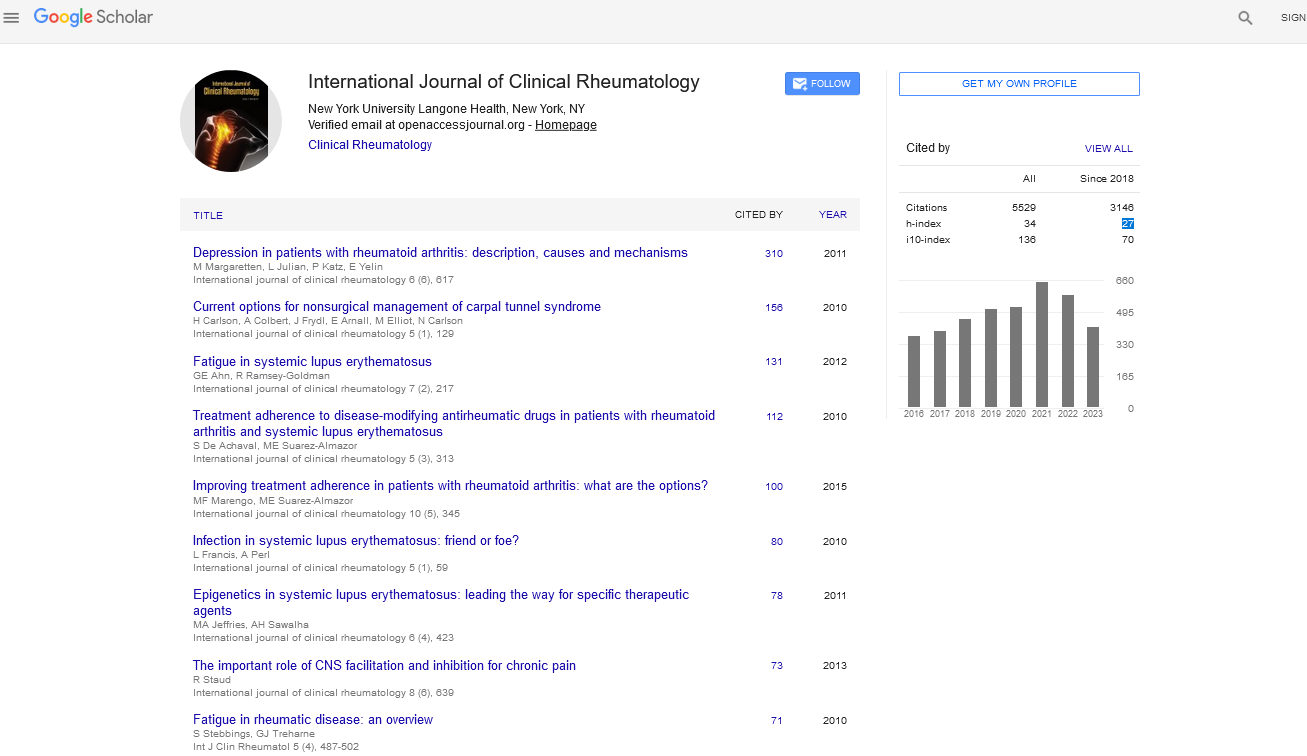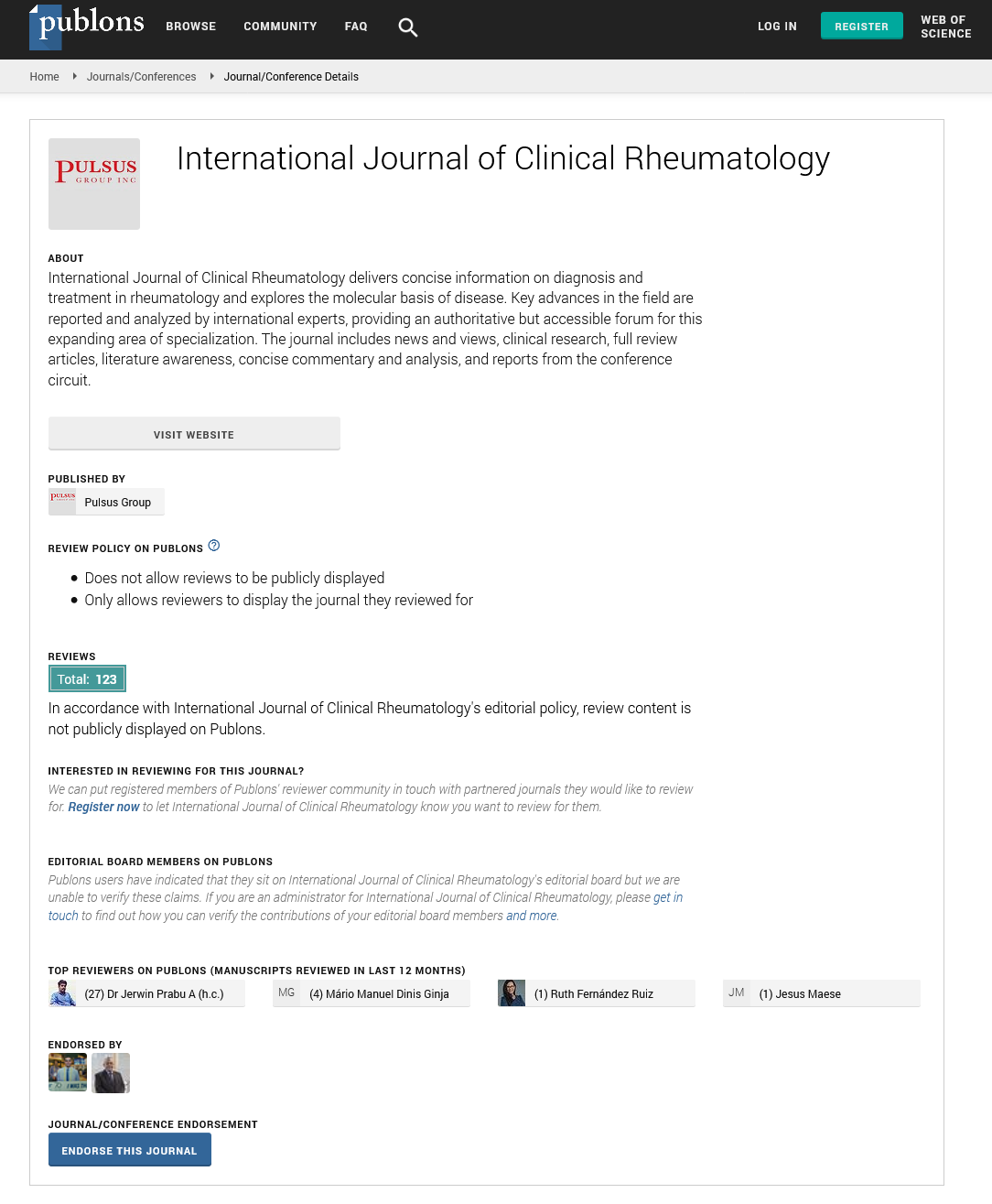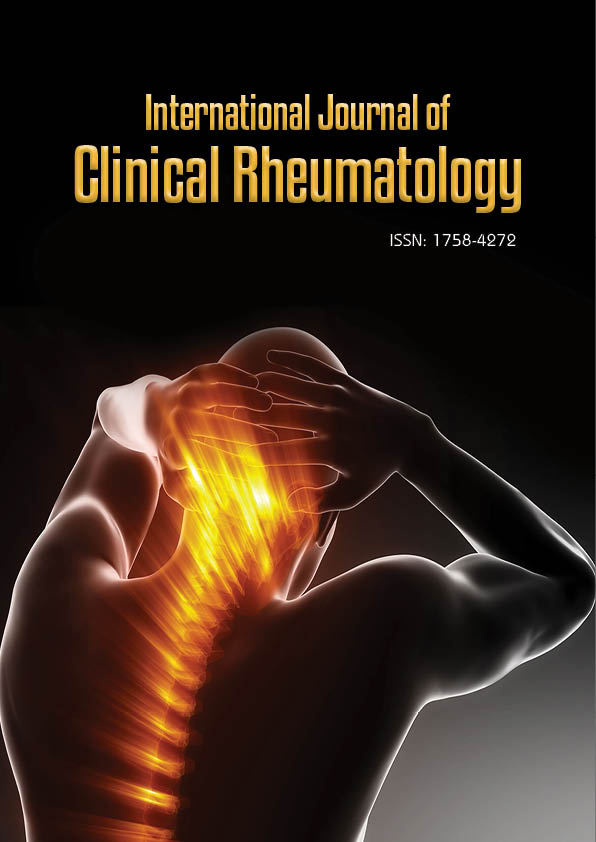Perspective - International Journal of Clinical Rheumatology (2022) Volume 17, Issue 8
Rheumatologist Suggests Number One Arthritis Drug is Underutilized, Underdosed
Ruth Fernandez-Ruiz*,
NYU Langone Health, 301 East 17th Street, Suite 1410, New York, NY 10003
- *Corresponding Author:
- Ruth Fernandez-Ruiz*
NYU Langone Health, 301 East 17th Street,Suite 1410, New York, NY 10003
E-mail: Ruth.FernandezRuiz@nyulangone.org
Abstract
Introduction
Physicians are underutilizing methotrexate, the leading drug for rheumatoid arthritis (RA), or not keeping patients on the drug long enough before switching them to more expensive biologic drug options, one expert suggests.
A University of Nebraska Medical Center rheumatologist revealed study results at a major national conference last week which showed that physicians are underutilizing methotrexate, the leading drug for rheumatoid arthritis (RA), or not keeping patients on the drug long enough before switching them to more expensive biologic drug options [1].
There are some major concerns here. It shows that we're not doing all we should with methotrexate, our number one therapy for rheumatoid arthritis. Methotrexate is the anchor drug for a class of drugs known as disease-modifying anti-rheumatic drugs (DMARDs) [2]. The DMARDS are much less expensive than the other class of drugs used to treat RA called biologics. Previous studies have shown that the DMARDs produce the same clinical benefits in the majority of RA patients as the biological treatment.
Description
To better understand how methotrexate is utilized for RA treatment in the United States, research team performed an exhaustive review of anonymous claims data on 274 million patients, representing 92 percent of all prescription drugs written in the U.S. The claims data was produced by Symphony Health Solutions.
From this data, researchers were able to follow the treatment course of 35,640 RA patients between 2009 and 2014 [3]. The key findings were:
• 15,599 (43.8 percent) continued treatment with oral methotrexate.
• 17,528 (49.2 percent) added or switched to a biologic treatment.
• A biologic was added at a median of 170 days and 41.5 percent of patients added a biologic agent within 90 days of the initiation of oral methotrexate.
• Only about 7 percent of patients followed were switched from oral to subcutaneous administration of methotrexate.
If oral methotrexate is not producing the desired results, the next step should be to try patients on subcutaneous methotrexate at a higher dose [4].
What we found in patients who made a treatment change was that 87 percent added a biologic instead of trying subcutaneous methotrexate. Patients switched to biologics too quickly - 41 percent switched in three months or less [5].
Switching to subcutaneous methotrexate can prevent the need for - or significantly extend the time to - a biologic.
Conclusion
The study found that 72 percent of patients who switched from oral to subcutaneous methotrexate stayed on this treatment for 5 years. The other 28 percent eventually needed a biologic, at a median of 289 days on subcutaneous methotrexate. The bottom line is that more appropriate optimization of methotrexate could lead to better control of RA and produce significant cost savings. Oral methotrexate is underdosed in clinical practice, and subcutaneous methotrexate is underutilized.
References
- Theis KA, Helmick CG, Hootman JM. Arthritis burden and impact are greater among US women than men: intervention opportunities. J Women's Health. 16(4), 441-453 (2007).
- Dieppe P, Basler HD, Chard J et al. Knee replacement surgery for osteoarthritis: effectiveness, practice variations, indications and possible determinants of utilization. Rheumatology (Oxford, England). 38(1), 73-83 (1999)
- Li L, Cui Y, Yin R et al. Medication adherence has an impact on disease activity in rheumatoid arthritis: a systematic review and meta-analysis. Patient Prefer Adherence. 11, 1343 (2017).
- Russak SM, Croft Jr JD, Furst DE et al. The use of rheumatoid arthritis health‐related quality of life patient questionnaires in clinical practice: lessons learned. Arthritis Care Res. 49(4), 574-584 (2003).
- Sturkenboom MCJM, Burke TA, Dieleman JP et al. Underutilization of preventive strategies in patients receiving NSAIDs. Rheumatology. 42(suppl_3), iii23-iii31 (2003).
Indexed at, Google Scholar, Crossref
Indexed at, Google Scholar, Crossref
Indexed at, Google Scholar, Crossref
Indexed at, Google Scholar, Crossref


